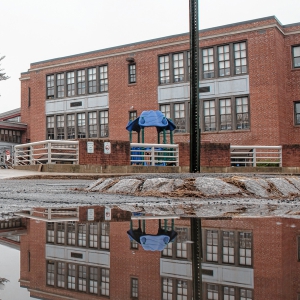Mickey Rathbun guest column: Mismanagement imperils Jones Library funding

STAFF FILE PHOTO STAFF FILE PHOTO
| Published: 12-01-2024 8:07 PM |
Amherst officials have repeatedly ignored their duty to comply with the National Environmental Protection Act (NEPA) and Section 106, a federal regulation meant to prevent “adverse effects” to historic buildings to the fullest extent possible. These failures have significantly jeopardized the library expansion project, whose financial viability is already shaky at best.
In early 2023, the project was provisionally awarded two federal grants totaling $2.1 million, with both contingent on compliance with NEPA and Section 106. Even though the town was advised to complete these reviews before the scope of the project was finalized, the town put the project out to bid in January 2024 without having started either review.
The sole bid, $6.5 million over budget, was rejected. Had a successful bid come in and a contract been signed, the town would likely have forfeited these grants.
Section 106 requires that the town and the Massachusetts Historical Commission sign a memorandum of agreement regarding the project’s adverse effects. Even though the commission warned the town a year ago that the project violated several federal standards of historic preservation, the town did not begin the Section 106 process until late August of this year — just weeks before sending the project out for rebidding.
In early October, the town acknowledged that “the project will have an ‘adverse effect’ on historic properties through the destruction of part of the Jones Library, alterations to the interior circulation and historic materials, and construction of a rear addition, and changes to the visual setting of the Amherst Central Business Historic District and the Strong House.”
The town received two bids on Oct. 31 that contractors were asked to hold for 60 days, expecting to complete the Section 106 review and sign a contract before a Dec. 31 deadline established by the state library granting agency, the Massachusetts Board of Library Commissioners.
In early November, the town got a wake-up call in the form of a letter from Brona Simon, the state historical commission’s executive director. In her letter, Simon expressed dismay that the town appeared not to understand the commission’s pivotal role in the Section 106 process, not only as a consulting party but as the agency responsible for negotiating a Section 106 MOA.
Article continues after...
Yesterday's Most Read Articles
 Northampton schools probe staff response to student’s unfulfilled IEP
Northampton schools probe staff response to student’s unfulfilled IEP
 Nearly all of South Hadley High’s student body holds ‘walkout to walk-in’ rally to oppose cuts, call for funding reform
Nearly all of South Hadley High’s student body holds ‘walkout to walk-in’ rally to oppose cuts, call for funding reform
 UMass Chancellor Reyes outlines changes amid financial uncertainty under Trump administration
UMass Chancellor Reyes outlines changes amid financial uncertainty under Trump administration
 Northampton Housing Authority boss placed on leave
Northampton Housing Authority boss placed on leave
 Hopeful buyers emerge for Magic Wings butterfly conservatory in South Deerfield
Hopeful buyers emerge for Magic Wings butterfly conservatory in South Deerfield
 ‘For the love of music’: Florence Community Band set to hold first-ever multigenerational concert
‘For the love of music’: Florence Community Band set to hold first-ever multigenerational concert
She also noted that the town neglected to notify the historical commission of the time and place of its Consulting Parties Meeting on Oct. 9, preventing its participation.
Simon’s letter requested that the town provide an “alternatives analysis” that should, at a minimum, include alternative analyses of roof materials, staircases and circulation, woodwork, and the size, scale, and massing of the proposed addition, suggesting that the MHC might seek substantial changes to the proposed project.
The town’s response to the MHC was basically that its 10 years of planning had already considered alternatives and it could offer no further changes to its plans. The MHC has yet to respond to this “alternatives analysis,” while the town has yet to announce any plans to comply with NEPA.
Because the NEPA and Section 106 processes are far from complete and construction contracts cannot be executed until they are, the town manager and the president of the library trustees recently asked the MBLC for a further extension, until March 31.
Even if another extension is granted, it is unclear how the two contractors whose bids have already been on hold will respond. Changes in labor and materials costs as well as modifications resulting from the Section 106 review could add significantly to the project’s cost. The Ttown’s insistence that these will be addressed by change orders may not be feasible or affordable.
Noneof these problems have been caused by the significant number of Amherst residents who have objected to the project in its present form, whom various town officials and employees dismiss as “naysayers” and “agitators.” Rather, these issues have arisen because the project has been poorly conceived and managed from the very beginning.
Despite Town Manager Paul Bockelman’s statement that he is the sole decision maker from this point forward, town councilors are stewards of the town’s financial resources. Regardless of their individual views of the project, they must demand that the Finance Committee complete a thorough analysis of the viability of the project and its impact on the town.
A lot has changed since the last time they looked at this a year ago. Due to the mishandling of Section 106, there is a very real danger that the town will lose $2.1 million in federal funding; $2 million in historic tax credits have already been lost; fundraising has secured only $2.2 million in donations with another $2.2 million pledged plus $1 million in Amherst CPA funds.
Even if all pledges and federal funds are realized, the library will still need to raise at least $7 million more, a figure that doesn’t include whatever additional costs are incurred to meet Sec. 106 requirements.
A majority of town councilors have ignored the inconvenient truth of the library project’s ballooning costs. But they cannot avoid their responsibility to safeguard the town’s financial security.
Mickey Rathbun lives in Amherst.






 Columnist Joanna Buoniconti: When your home feels more like a workplace
Columnist Joanna Buoniconti: When your home feels more like a workplace Michael John Kowalchuk: Make Massachusetts a sanctuary state
Michael John Kowalchuk: Make Massachusetts a sanctuary state Larry Cervelli: Betrayal of traditional American values — Moral injury that won’t heal
Larry Cervelli: Betrayal of traditional American values — Moral injury that won’t heal Susan McClellan: Goodbye Beaver Brook
Susan McClellan: Goodbye Beaver Brook
